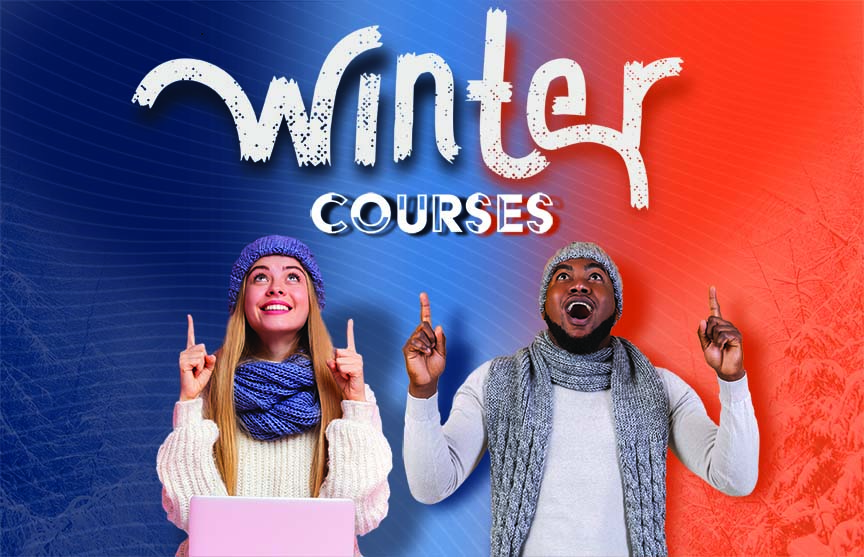
Are you interested in taking a music course, but you’re not a music major? Then MUS 130: Music Then and Now is for you!
This three-credit-hour class provides non-music majors with basic listening skills, the ability to discuss music intelligently, and an acquaintance with many types of music. You don’t need a music background; you just need to enjoy music.
MUS 130 is one of 100-plus online courses that’s being offered during Winter Session this year. If music isn’t your thing, then check out these other courses:
CHLH:330 and REHB 330: Disability in American Society (3 credit hours)
This introductory course to disabilities studies provides students with a broad overview of the history of challenges faced by individuals with disabilities and the Disabilities Rights Movement to secure equal rights and passage of the Americans with Disabilities Act. Students will also delve into contemporary issues, challenges, programs that are available to individuals with a disability, and different ways to support them.
RST 100: Recreation, Sport and Tourism in Modern Society (3 hours)
This course examines central issues in defining leisure, recreation, sport, and tourism. Historical, philosophical, sociological, psychological, and economic approaches to understanding these areas, their behaviors and meanings, social contexts, and personal and social resources are examined. By the end of the semester, students should understand their history and evolution, as well as their impact on contemporary society.
ACE 240: Personal Financial Planning (3 hours)
This course examines principles of financial planning applied to individuals and households, with attention to organizing and analyzing financial information, budgeting, acquiring financial assets, managing credit, planning for taxes, investments, risk management, retirement, and estate planning.
SPAN 142: Spanish in the Professions (4 hours)
Students will get an introduction to Spanish in business, law, medical, education, and social service fields, with a focus on the importance of bilingualism in the U.S, strategies for lifelong learning, and cultural considerations. The development of functional use of Spanish within the professional context is the major focus of the course.
MACS 356 and GWS 356: Sex & Gender in Popular Media (3 hours)
This course examines the notion that the mass media influence our development as gendered individuals, looking at those who argue for and against this notion. It also considers different forms of feminist theory applied to the study of mass media, the history and scholarly criticisms of the media and their portrayal of women, and feminist attempts to create alternatives to mainstream media images. Throughout, the course considers representation of minorities in the dominant media and examines newly created alternative representations.
ESE 360 and ENGL 360: Environmental Writing (3 hours)
This course equips students to write about the environment for various audiences, with a focus on specific current efforts to promote sustainability on the Urbana-Champaign campus. We will practice effective techniques for each stage of the writing process-from defining topics, to gathering information, to crafting active, engaging prose. Readings will include models of effective environmental writing and "how to" pieces by experts. Research will include
BADM 380: International Business (3 hours)
This course introduces the field of international business and management; examines the economic, political, and legal environments of international business; and analyzes differences in financial management, marketing, and management practices for firms doing business abroad.
REL 110 and PHIL110: World Religions (3 hours)
This course is a survey of the leading living religions, including Hinduism, Buddhism, Confucianism, Taoism, Judaism, Christianity, and Islam. Students will examine basic texts and philosophic theological elaborations of each
ATMS 120 and ESE 120: Severe and Hazardous Weather (3 hours)
Most extreme manifestations of weather and climate are analyzed in terms of their physical basis and their historical, economic, and human consequences. Emphasis is placed on the interplay between technological advances, the evolution of meteorology as a science, and the impacts of extreme weather (winter storms, floods, severe thunderstorms, hurricanes, El Nino). Technological advances include satellites, weather radars and profilers, and computer models used for weather prediction.
Winter Session runs December 21 through January 15, 2021 and is open to current undergraduate and non-degree students from around the globe. Priority registration begins on November 30.
Check out the full course listing at online.illinois.edu/winter.